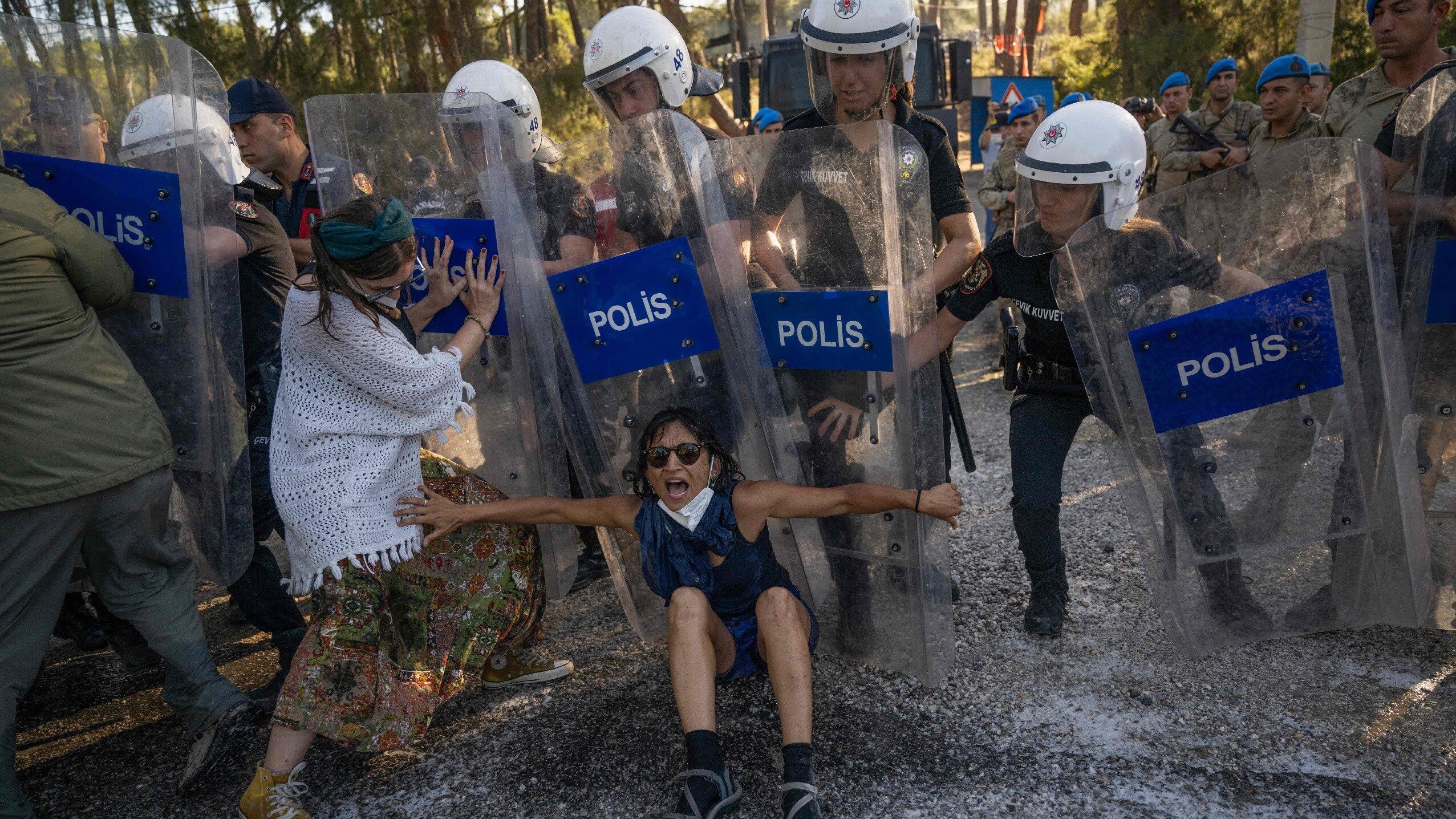Protesters Vow To Continue Fight To Stop Mine Expansion in Turkish Forest
Moves to fell trees in the southwestern Akbelen Forest, used for agriculture and tourism, have sparked what are said to be the biggest grassroots protests since nationwide anti-government demonstrations in 2013
Protesters demonstrating against the expansion of a mine in a southwestern Turkish forest say they will continue to fight against the construction, even though tree clearing has begun.
The energy companies behind the deforestation were given government permission in 2020 to expand the coal mine in the Akbelen Forest, near the town of Ikizköy in Muğla province. The mine will provide energy to thermal power plants linked to the government.
Protesters began to hold vigils in the forest in 2021, but they garnered more attention over this summer as the tree cutting was due to start.
Doing a mining project in agricultural land is the story of Turkish transformation of the past 40 years, from an agricultural society to a much more industrial society, and in this process who wins is the big companies
Local resident Umut Kocagöz, who has been protesting alongside local villagers, told The Media Line that the demonstrations would continue to try to stop the land being dug up for the expansion. As well as being used for agriculture, the area is also popular for tourism, a key industry in the country’s economy.
Kocagöz said there were still trees left in the forest and it could renew itself if digging was prevented.
“Doing a mining project in agricultural land is the story of Turkish transformation of the past 40 years, from an agricultural society to a much more industrial society, and in this process who wins is the big companies,” he said.
Kazim Kizil, a video journalist who has been documenting the protests, said that activists would continue demonstrating and that they believed it was not too late to save the forest.
“Trees are cut down, but we can save the land,” he said.
Violence has broken out at the protests, with police using water cannons and batons against activists.
Kizil said he once was about to film a protester being injured when a gendarme stopped him.
“He ordered me not to come, as if [I] were a soldier working under his command,” Kizil said.
He said the gendarme sprayed tear gas in his eyes.
At first, the villagers were more concerned about their own fields and their houses, now they are talking about concepts such as climate change, climate crisis, food crisis
Kizil said the demonstrations were both about the villagers’ struggle against the mine expansion and the wider issue of climate change.
“At first, the villagers were more concerned about their own fields and their houses, now they are talking about concepts such as climate change, climate crisis, food crisis,” he said.
Environmental protests have often become highly political in Turkey.
Demonstrations against planned construction in Gezi Park, next to Taksim Square in central Istanbul, led to nationwide anti-government protests in 2013, which were followed by a crackdown on journalists and civil rights activists.
Işıl Demirakin, of the Turkish NGO the Association for Monitoring Equal Rights, told The Media Line that the Akbelen protest is one of the biggest grassroots movements since the Gezi Park demonstrations.
“We started realizing that you have to also deal with the economic side of things,” Demirakin said. “Economic and political rights had become one of the emerging topics for us, and [with] these protests, we started seeing that.”
Demirakin said that protesters have faced legal harassment, such as having passports taken away or being forced to register at a police station twice a week.
Seda Alp, also from the Association for Monitoring Equal Rights, said that speaking out about environmental issues enabled people to speak out about their interests in a way that felt safe, in a climate in which other critical voices have been suppressed.
“This also brings many supporters to the movement,” Alp told The Media Line. “People are afraid of saying anything against the government.”
The protests have garnered national attention.
Kemal Kılıçdaroğlu, the head of the main opposition party, the Republican People’s Party, visited villagers at the end of July to show support and told demonstrators he stood with them.
Turkey relies on foreign sources to meet much of its energy needs, with Russian imports accounting for nearly 40% of Turkey’s natural gas.
This makes Turkey dependent on a country with which it often has competing geopolitical interests, and it has been keen to find more domestic sources of energy, taking aggressive action to drill for gas in the Eastern Mediterranean, where it has conflicting territorial claims with Cyprus. In 2018, a Turkish navy ship blocked an Italian ship from going to the area.
In addition, Turkey’s economy has been struggling for years. Inflation has devalued the currency and increased food prices, hurting President Recep Tayyip Erdoğan’s popularity.


